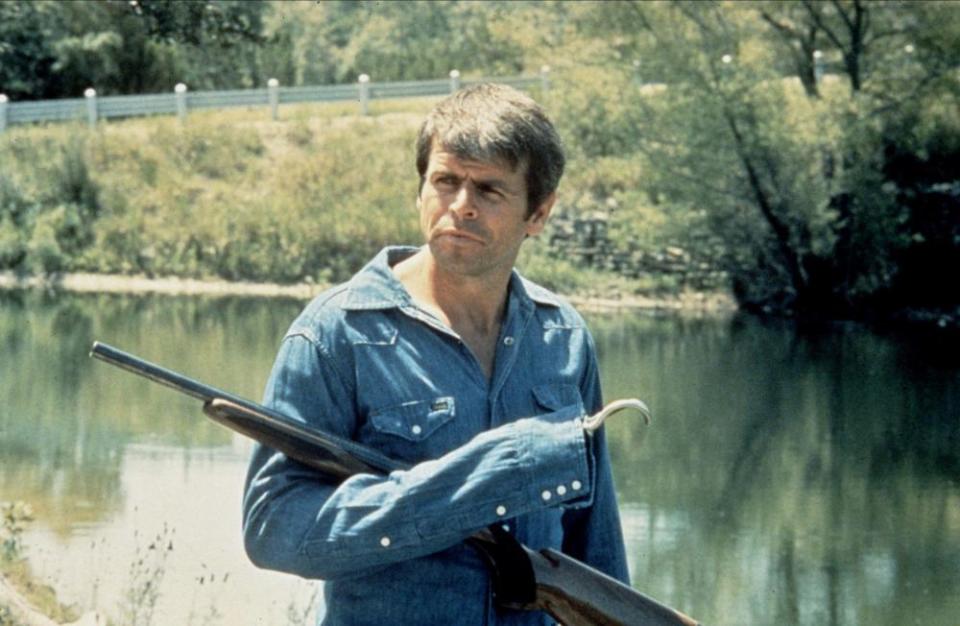Cinema Speculation by Quentin Tarantino review – bracing and heartfelt collection
Some years ago, purely for work purposes, I visited a “cult TV convention” at a hotel in Solihull, where the fans at the bar were all dressed as Klingons and Peter Tork from the Monkees hosted an unruly pub quiz. Parked at a table, the B-movie actor John Saxon signed souvenir headshots for £10 a time. Saxon was in attendance thanks to his roles in Falcon Crest, Dynasty and The Six Million Dollar Man, but the indignity of the occasion showed on every line of his face. “I once made a movie with Marlon Brando,” he explained with a sigh.
Had the road forked, it could all have been different. Midway through Cinema Speculation, Quentin Tarantino mentions Saxon as one of his early choices to play Max Cherry, the careworn bail bondsman in the 1997 film Jackie Brown. While the part eventually went to Robert Forster, another B-movie mainstay, this casual aside hints at an alternative history, a parallel track. Indirectly, it reminds us that movies are serendipitous, defined as much by rewrites, casting coin-flips and crowd reaction as they are by any singular auteurist vision. Jeff Bridges almost starred in Taxi Driver. Steve McQueen was nearly the Sundance Kid. Every film – great or small – carries the ghosts of the films that it might have been.
Tarantino likes looking under the bonnet and pulling at the fabric, showing how a film was put together
Which brings us to the rollicking, ramshackle Cinema Speculation, Tarantino’s debut collection of film criticism, arriving hard on the heels of his novelisation of his 2019 film Once Upon a Time … in Hollywood. It’s fascinated by the inexact science of movie production and promotion, the behind-the-scenes niggles that created the classics. Tarantino likes looking under the bonnet and pulling at the fabric, showing how a film was put together and explaining how it could have gone other ways. Or rather, he does until he doesn’t: until his focus shifts and his attention pivots and he promptly starts chasing a fresh train of thought. His book embodies its sliding-doors concept, almost to a fault.
But for a combination of talent and chutzpah, the director might have spent his days on the convention circuit himself. He’s the video-store geek who struck gold, the fanboy turned emperor. Some film-makers prefer to conceal their influences (“I feel like the inventor of cinema,” said Werner Herzog). Tarantino, endearingly, wears his on the outside, like a one-man Pompidou Centre with all the piping exposed. True to form, Cinema Speculation conducts a personal joyride through his film education, veering from the recognised heavyweights of 1970s Hollywood (Deliverance, Rocky, Dirty Harry) to a menagerie of scrappy unsung outsiders.

Tarantino pays lavish tribute to John Flynn’s 1977 thriller Rolling Thunder (the film, he feels, that gave him permission to be a director) and Kevin Thomas (one-time second-string critic at the Los Angeles Times). Jumping the points, he grants a standalone chapter to Floyd Ray Wilson, a flaky childhood mentor and wannabe screenwriter who planted the seed for 2012’s Django Unchained. “I don’t know how [Floyd] died, where he died or where he’s buried,” he says. “But I do know I should’ve thanked him.”
As a critic, it transpires, Tarantino writes exactly as he speaks, in a torrent of information and opinions; fuelled by breathless enthusiasm and unexplained grudges, rhetorical questions and full-throttle digressions. He’s frequently at loggerheads with the films that he loves, all but browbeating the scriptwriter Walter Hill to rubber-stamp his issues with Sam Peckinpah’s 1972 movie The Getaway. Tarantino’s celebration of Taxi Driver, moreover, is very nearly a roast. Having convincingly established the film as essentially a “paraphrased remake” of John Ford’s western The Searchers, he can’t resist slamming what he regards as its compromised racial politics and accusing Martin Scorsese of hypocrisy for his pious stance on screen violence. Taxi Driver was at pains to paint its antihero Travis Bickle as a traumatised war veteran. Hilariously, Tarantino isn’t buying that either. He says: “No fucking way was Travis in Vietnam.”
I’m tempted to file Cinema Speculation as a paraphrased remake itself – an extended extrapolation of its author’s film-making day job. As with his pictures, it’s garrulous, indulgent and in desperate need of an edit. But it’s also bracing and heartfelt, positively ringing with life. Tarantino is happiest going deep on the pictures; he largely leaves himself unexamined. Nonetheless, this whiplashing tour sheds light on his apprenticeship, revealing the rackety upbringing of the boy who would one day be king. Like Proust with his madeleine, he remembers being dragged by his mum and her dates to see blaxploitation pictures at the Tower theatre in Compton, California. Tarantino recalls the wonder, the danger, the sense of tasting forbidden fruit. It’s an experience, he says, he’s been trying to replicate ever since. He’s come close with his films. He comes close, too, with this book.
• Cinema Speculation by Quentin Tarantino is published by Weidenfeld & Nicolson (£25). To support the Guardian and Observer order your copy at guardianbookshop.com. Delivery charges may apply


